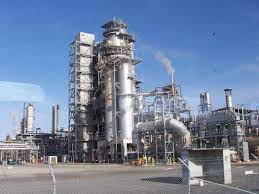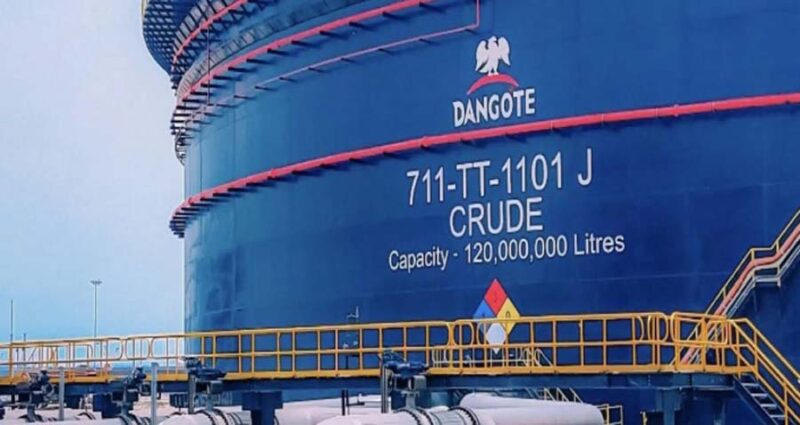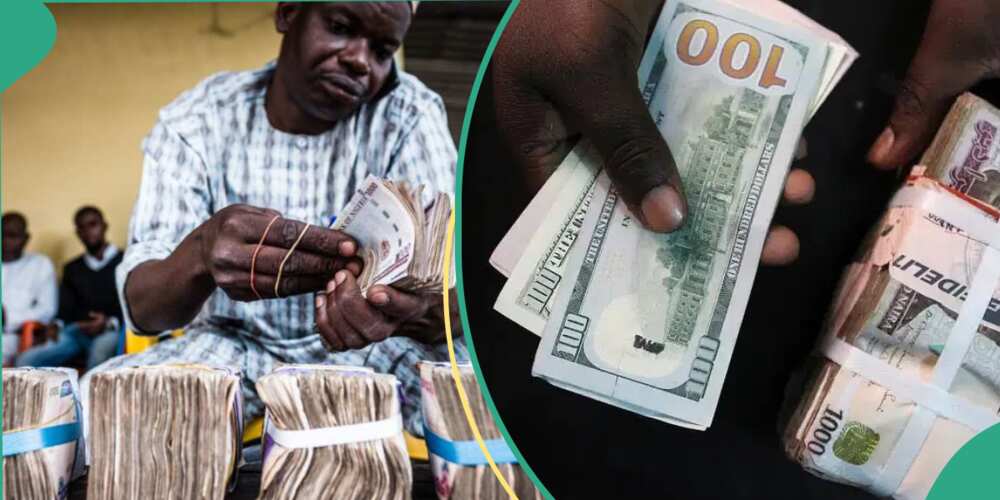Business
Updated: Reps to probe alleged sabotage at Warri refinery

The House of Representatives is set to investigate alleged sabotage at the Warri Refining and Petrochemical Company, which has reportedly stalled its operation.
It has therefore asked the Group Managing Director of the Nigerian National Petroleum Corporation, Mele Kyari, to furnish its Committee on Petroleum Resources (Upstream) with details and circumstances surrounding the storage lease at the company.
The lawmakers mandated the committee to investigate the failure and the neglect by the NNPC to address the haulage challenges such as inadequate storage tanks affecting the Warri refinery to forestall the frequent shutdown of the company and report back to the House in four weeks.
The House passed the resolutions following a motion by Ben Igbakpa (Delta PDP) on the commencement of operations at the Warri Refining and Petrochemical Company.
Igbakpa said the refinery had been mandated to produce refined products from local crude and that the three main sections of the production department, namely: reforming, crude distillation and catalytic cracking units had operated for the past eight years due to the efforts of its personnel.
The lawmaker said the plants were operating at an output of around 115m3/hour translating to about 68 per cent installed capacity.
He listed products being supplied from the refinery as premium motor spirit (PMS) or petrol, automotive gas oil, kerosene, LPG, low pour fuel oil for ships and industrial fuel and carbon black.
The lawmaker said, “The House is disturbed that the refinery has not operated optimally due to alleged top management decisions of the Nigerian National Petroleum Corporation (NNPC) to ground the plant for personal benefit from marketers importing products that can be produced in the refinery;
“Concerned that the plant had severally shut down due to haulage challenges, neglect in the evacuation of products, lack of functional or operational storage tanks and poor maintenance culture on the part of management which also constitutes another reason for the refinery non – functionality;
“Aware of the alleged plan to ground the plant from refining products by members of the top echelon of the Warri Refinery in collaboration with the Chief Operating Officer (COO) as well as diverting crude meant for refining.”
He also said he was “aware that when crude oil is delivered from Escravous tank farm for refining, the products are hoarded for about 14 days and thereafter diverted through the refinery jetty to interested buyers (or specific companies they have special interests in) who pay less. The resultant effects of this perceived economic sabotage is that the plant is brought down because no crude to refine as it has been diverted.
“Further aware that when it became apparent that the management of Warri Refinery has abandoned their responsibility of maintaining the plant, the staff of the refinery on several occasions contributed their money to buy materials and tools to fix faulty equipment.”
The lawmaker said that it was alarming that “currently, most of the spherical tanks used for storage of Liquefied Petroleum Gas (LPG) have been leased out to Kwale Hydrocarbon Nigeria Limited (KHNL), a private company, while other storage tanks are being leased out to private interests all in a bid to ensure that the Warri Refining and petrochemical company remains shut down indefinitely, even when the said refinery has the production capacity of 75 per cent.”
He alluded to the inadequacies at the refinery and others as largely responsible for the crisis in the nation’s petroleum industry sector with regard to supply and pricing.
He said, “Cognizant that the Federal Government has officially confirmed the return of fuel subsidy, as the Petroleum Products Pricing Regulatory Agency (PPPRA) has on 11 March 2021 fixed the pump price of PMS also known as petrol, at N212.61 per liter, for March, which the Minister of State for Petroleum Resources and NNPC has denied yet petroleum marketers sell between N175 – N200 depending on the location;
“Also cognizant that the increase is due to the shutdown of local refineries and create the cost elements of the commodity which the Petroleum Products Price Regulatory Agency ( PPPRA) analyzed as comprising the addition to the ex-coastal price of average lightering expenses, Nigerian Maritime Administration (NIMASA) charges, jetty throughput charges, storage charge and average financing costs with the inclusion of retailers’ margin has now brought the pump price of the commodity to 212.61 per litre.”
Business
Govt paying N600bn for fuel subsidy monthly — Rainoil CEO

Govt paying N600bn for fuel subsidy monthly — Rainoil CEO
The CEO of Rainoil Limited, Gabriel Ogbechie, has claimed that the federal government resumed the payment of the controversial fuel subsidy following the devaluation of the Naira in the foreign exchange market.
Ogbechie made this statement on Tuesday during the Stanbic IBTC Energy and Infrastructure Breakfast Session held in Lagos.
He pointed out that with Nigeria’s daily fuel usage at 40 million liters and the foreign exchange rate at N1,300, the government’s subsidy per liter of fuel falls between N400 and N500, culminating in a monthly total of approximately N600 billion.
He said; “When Mr. President came in May last year, one of the things he said was that Subsidy is gone. And truly, the subsidy was gone, because immediately the price of fuel moved from 200 to 500 per liter. At that point truly, subsidy was gone.
“During that period, Dollar was exchanging for N460, but a few weeks later, the government devalued the exchange rate. And Dollar moved to about N750. At that point, subsidy was beginning to come back.
READ ALSO:
- North Central Support Group rejects Northern Elders, pledges allegiance to Asiwaju
- Gunmen kidnap 2 FRSC officers along Abakaliki-Enugu highway
- Driver killed, 16 passengers abducted on Abuja-Lokoja road
“The moment the two markets officially closed, officially the market went to about N1,300. At that point, that conversation was out of the window. Subsidy was fully back on petrol. If you want to know where petrol should be, just look at where diesel is. Diesel is about N1,300 and petrol is still selling for N600.
Furthermore, he said that NNPC being the only petrol importer in the country implies that there is an ongoing subsidy, as prices had to be fixed.
Earlier yesterday, the former governor of Kaduna State, Nasir El Rufai, said the federal government is spending more on petrol subsidy than before.
In addition, the Special Adviser to the President on Energy, Mrs. Olu Veŕheijen, said that the Federal Government reserves the right to pay fuel subsidy intermittently to cushion hardship in the country.
“The subsidy was removed on May 29. However, the government has the prerogative to maintain price stability to address social unrest. They reserve the right to intervene.
“If the government feels that it cannot continue to allow prices to fluctuate due to high inflation and exchange rates, the government reserves the right to intervene intermittently and that does not negate the fact that subsidy has been removed,” she said.
Govt paying N600bn for fuel subsidy monthly — Rainoil CEO
Business
Breaking: Dangote brings diesel price down to N1000/litre

Breaking: Dangote brings diesel price down to N1000/litre
Dangote Petroleum Refinery has announced a further reduction in the price of diesel.
When it commenced operation a few weeks ago, Dangote Petroleum Refinery pegged the price of diesel as N1,200.
While rolling out the products, the refinery supplied at a substantially reduced price of N1,200 per litre three weeks ago, representing over 30 percent reduction from the previous market price of about N1,600 per litre.
READ ALSO:
- Kano anti-corruption agency slams fresh charges against Ganduje
- Troops kill ISWAP Commanders, 30 other terrorists
- Ooni of Ife dismisses agitators of Yoruba nation
However, on Tuesday, a further reduction of N200 was noticed in the price, with the product now pegged at N1,000.
This significant reduction in the price of diesel, at Dangote Petroleum Refinery, is expected to positively affect all the spheres of the economy and ultimately reduce the high inflation rate in the country.
The President of Dangote Group, Aliko Dangote, had during the Eid-el-Fitr celebration said if the cost price of diesel comes down, the inflation rate will be substantially reduced.
Dangote spoke when he visited President Bola Tinubu in his residence in Lagos State to celebrate the end of the Ramadan fast with him.
Breaking: Dangote brings diesel price down to N1000/litre
Business
Naira records five-month highest gain, sells below N1000/$ at parallel market

Naira records five-month highest gain, sells below N1000/$ at parallel market
The naira continued its positive showing against the United States dollar on Monday, selling below N1000/$ in some segments of the parallel market.
Newstrends reports that the Federal Government, groups and some individuals have mounted a spirited campaign for those hoarding the dollars to push them out as naira continues to appreciate.
On Monday, the naira was offered in some parts of Lagos and Abuja between N995 and N1,050 per dollar in the parallel market. It was N1,230/$ on Friday.
The latest gain, being over five-month highs, came in the wake of the Iranian attack on Israel and a rise in the crude oil price.
Goldman Sachs, American investment bank economists, had earlier predicted that the naira’s bullish momentum on the foreign exchange market would likely cause it to trade for less than N1,000 per US dollar in the coming months.
According to a report by Nairametrics, the group claimed that the rally in Nigerian currency helped recover from large losses after two devaluations since last June by being bolstered by capital inflows and successive interest rate hikes.
In March, Goldman Sachs projected that the Naira would appreciate to N1,200 per dollar in 2024.
At the official foreign exchange market, the rate was put at N1,136/$ in contrast with N1,205/$ last Friday.
The top bank has implemented several policy initiatives in recent months to bring stability to the foreign exchange market.
The CBN increased interest rates to 24.75% at the most recent meeting of the Monetary Policy Committee (MPC), which helped it recover losses from the two devaluations that occurred since June of last year.
Further gains for the naira result from the CBN’s ongoing intervention, which involves selling foreign exchange to Bureau De Change operators at a revised rate.
The market anticipates higher inflows of US dollars from the sale of foreign currency bonds in the second quarter as disclosed by Finance Minister Wale Edun.
The Federal Government has just offered high-yield short-term debt products at a premium to entice overseas capital into the economy.
The Middle East’s geopolitical unrest and
Notwithstanding a drop in Nigeria’s production volume, crude oil prices have risen beyond $90.
Nigerian grades of oil are trading at a premium to the ICE Brent benchmark.
The Middle East’s geopolitical unrest and the anticipation of an Iranian government strike on Israel caused oil prices to soar.
-

 metro7 days ago
metro7 days agoTroops arrest ISWAP commander involved in Army General, 3 soldiers’ killing in Borno
-

 News7 days ago
News7 days agoBREAKING: Ex-Abia gov, Ogbonnaya Onu, is dead
-

 Sports6 days ago
Sports6 days agoKane’s three children involved in car crash, hospitalised
-

 metro5 days ago
metro5 days agoTroops neutralise 188 terrorists, rescue 133 hostages in assault operations
-

 News5 days ago
News5 days agoFG gives update on where fleeing Binance executive is hiding
-

 News7 days ago
News7 days agoEdo APC chairman visits Shaibu after impeachment
-

 Entertainment5 days ago
Entertainment5 days agoTolani Baj expresses love for Bobrisky
-

 Business5 days ago
Business5 days agoNaira continues gain, sold N1,150/$ at parallel market














